-
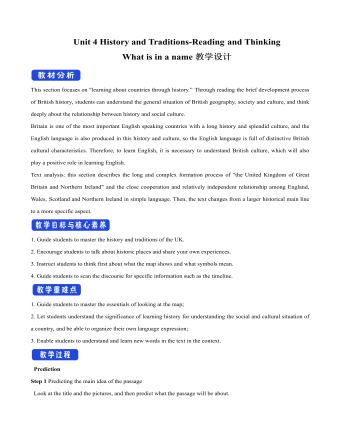
新人教版高中英语必修2Unit 4 History and Traditions-Reading and Thinking教案一
Features of languages1.Finally, in the 20th century, the southern part of Ireland broke away from the UK, which resulted in the full name we have today: the United Kingdom of Great Britain and Northern Ireland.该句是一个复合句。该句主句为:the southern part of Ireland broke away from the UK;which resulted in the full name we have today为which引导的定语从句代指前面整句话的内容,we have today为定语从句修饰先行词name。译文:最后,在20世纪,爱尔兰南部脱离英国,这导致了我们今天有的英国的全名:大不列颠及北爱尔兰联合王国。2.Almost everywhere you go in the UK, you will be surrounded by evidence of four different groups of people who took over at different times throughout history.该句是一个复合句。该句主句为:you will be surrounded by evidence of four different groups of people;其中Almost everywhere you go in the UK为让步状语从句; who took over at different times throughout history为定语从句修饰先行词people。译文:几乎无论你走到英国的任何地方,你都会发现历史上有四种不同的人在不同的时期统治过英国。3.The capital city London is a great place to start, as it is an ancient port city that has a history dating all the way back to Roman times.该句是一个复合句。该句主句为:The capital city London is a great place to start; as it is an ancient port city that has a history dating all the way back to Roman times.为原因状语从句;dating all the way back to Roman times为现在分词短语作定语修饰history。
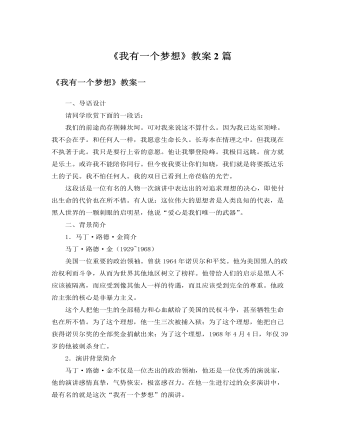
人教版高中语文必修2《我有一个梦想》教案2篇
全班齐读第五段内容。请一位同学分析,接着让这位同学按他分析的读一遍。3、4两自然段的平缓之后,第5段作者的情感再次抬升。为了满足这种情感的张扬,作一口气连用了四个排比句式“现在是……时候”,一方面这是情感发泄的需要,另一方面这种排山倒海的语势也加强了内容的表达,极强地突出了现实为自由、平等而战的重要性。四、学会演讲我们刚才细读了课文,但读和讲是有区别的。所谓演讲,是一门语言艺术,它的主要形式是“讲”,即运用有声语言并追求言辞的表现力和声音的感染力;同时还要辅之以“演”,即运用面部表情、手势动作、身体姿态乃至一切可以理解的态势语言,使讲话“艺术化”起来,从而产生一种非凡的艺术魅力。那么,接下来就假设一下假如你是马丁·路德·金,你会怎样去讲这篇演讲辞。
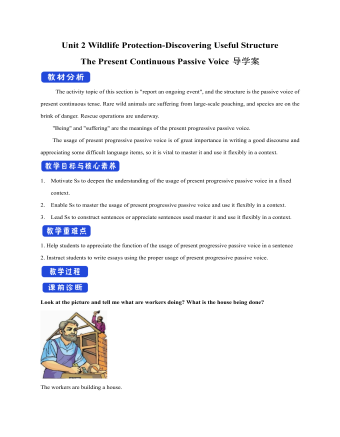
新人教版高中英语必修2Unit 2 Wildlife Protection-Discovering Useful Structure教案一
The activity topic of this section is "report an ongoing event", and the structure is the passive voice of present continuous tense. Rare wild animals are suffering from large-scale poaching, and species are on the brink of danger. Rescue operations are underway. "Being" and "suffering" are the meanings of the present progressive passive voice.The usage of present progressive passive voice is of great importance in writing a good discourse and appreciating some difficult language items, so it is vital to master it and use it flexibly in a context.1. Motivate Ss to deepen the understanding of the usage of present progressive passive voice in a fixed context.2. Enable Ss to master the usage of present progressive passive voice and use it flexibly in a context.3. Lead Ss to construct sentences or appreciate sentences used master it and use it flexibly in a context.1. Help students to appreciate the function of the usage of present progressive passive voice in a sentence2. Instruct students to write essays using the proper usage of present progressive passive voice.Look at the picture and tell me what are workers doing? What is the house being done?
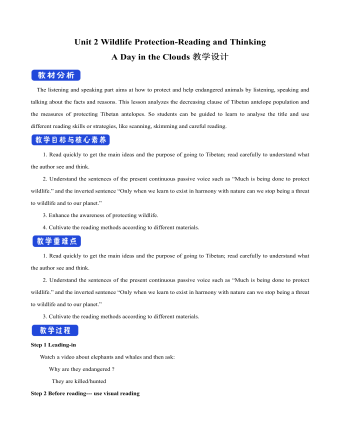
新人教版高中英语必修2Unit 2 Wildlife Protection-Reading and Thinking教案一
The listening and speaking part aims at how to protect and help endangered animals by listening, speaking and talking about the facts and reasons. This lesson analyzes the decreasing clause of Tibetan antelope population and the measures of protecting Tibetan antelopes. So students can be guided to learn to analyse the title and use different reading skills or strategies, like scanning, skimming and careful reading.1. Read quickly to get the main ideas and the purpose of going to Tibetan; read carefully to understand what the author see and think.2. Understand the sentences of the present continuous passive voice such as “Much is being done to protect wildlife.” and the inverted sentence “Only when we learn to exist in harmony with nature can we stop being a threat to wildlife and to our planet.”3. Enhance the awareness of protecting wildlife.4. Cultivate the reading methods according to different materials.1. Read quickly to get the main ideas and the purpose of going to Tibetan; read carefully to understand what the author see and think.2. Understand the sentences of the present continuous passive voice such as “Much is being done to protect wildlife.” and the inverted sentence “Only when we learn to exist in harmony with nature can we stop being a threat to wildlife and to our planet.”3. Cultivate the reading methods according to different materials.Step 1 Leading-inWatch a video about elephants and whales and then ask:Why are they endangered ? They are killed/hunted
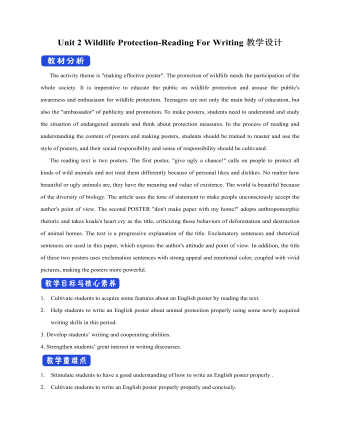
新人教版高中英语必修2Unit 2 Wildlife Protection-Reading For Writing教案一
1. 标题首先根据海报的特点、格式写明标题。海报中往往把内容作为大标题。例如: Save the earth, Save the birds。2. 正文部分不同的海报其正文部分的侧重点不同。对于介绍性的海报, 首先要引出话题, 其次列出原因, 最后是总结。对于宣传类的海报, 要写明具体内容, 如: 活动内容, 地点以及参加活动的注意事项, 主持或举办单位等。1. 图片: 要选择引人注目的图片, 与主题要相关, 色彩明亮。话题句式 1. It is a treasure of our country. 它是我国的国宝。2. Believe it or not, at present only several thousand pandas exist in the world. 信不信由你, 目前世界上仅现存几千只熊猫。 3.It’s because of human activities that tigers are endangered. 正是因为人类的活动, 老虎处于濒危的状态。4. Many wild animals are in danger of dying out. 很多野生动物面临着灭绝的危险。 5. The government has taken effective measures to protect them. 政府已采取有效的措施来保护它们。6. People should raise the awareness of the protection of wild animals. 人们应该提高保护野生动物的意识。 7. It’s amazing that there are merely less than 1, 000 finless porpoises living in China. 非常令人吃惊, 目前中国仅有不足1 000只江豚。
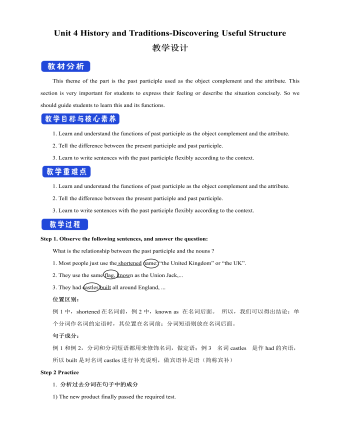
新人教版高中英语必修2Unit 4 History and Traditions-Discovering Useful Structure教案一
Step 5 Practice一、完成下列句子。1. Judy and I _______________(把车停下来(park))in an underground car Park near Trafalgar Square, where we could ______________________(让我们的车充电(charge)).2. When we finally reached the service desk to ask for audio guides, we heard it ___________ that there were no audio guides____________(留下,剩下).3. We__________________________(发现自己对...很惊讶)the large number of visitors and the amount of noise at the entrance of the National Gallery.4. Judy ____________________(眼神专注于) Van Gogh’s Sunflowers. It was hard to approach the painting as there were so many people around.5. She ____________________(把这幅画的复制品装箱(box)) to ensure that it was delivered safely.答案:1.had our car parked get our car battery charged 2. announced left 3. found ourselves very surprised 4. had her eyes fixed on 5. had a copy of the painting boxed二、用过去分词对下列句子进行改写。1. Loch Ness was surrounded by beautiful natural landscape, which made it look amazing.2. Carl and his friend stayed with a generous family who offered them bread with butter and honey that was homemade.3. The family’s ancestors once attended to soldiers who were wounded in the First World War.4. The young people were attracted by the legend of Loch Ness. They watched over the lake with their cameras and binoculars, which were positioned on the hill.答案:1. Loch Ness surrounded by beautiful natural landscape looks amazing.2. Carl and his friends stayed with a generous family who offered them homemade bread with butter and honey.3. The family’s ancestors once attended to wounded soldiers in the First World War.4. The young people attracted by the legend of Loch Ness watched over the lake with their cameras and binoculars positioned on the hill.
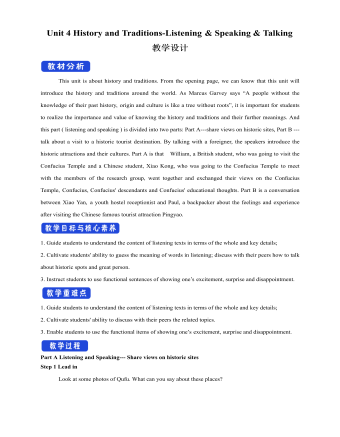
新人教版高中英语必修2Unit 4 History and Traditions-Listening&Speaking&Talking教案一
This unit is about history and traditions. From the opening page, we can know that this unit will introduce the history and traditions around the world. As Marcus Garvey says “A people without the knowledge of their past history, origin and culture is like a tree without roots”, it is important for students to realize the importance and value of knowing the history and traditions and their further meanings. And this part ( listening and speaking ) is divided into two parts: Part A---share views on historic sites, Part B ---talk about a visit to a historic tourist destination. By talking with a foreigner, the speakers introduce the historic attractions and their cultures. Part A is that William, a British student, who was going to visit the Confucius Temple and a Chinese student, Xiao Kong, who was going to the Confucius Temple to meet with the members of the research group, went together and exchanged their views on the Confucius Temple, Confucius, Confucius' descendants and Confucius' educational thoughts. Part B is a conversation between Xiao Yan, a youth hostel receptionist and Paul, a backpacker about the feelings and experience after visiting the Chinese famous tourist attraction Pingyao.1. Guide students to understand the content of listening texts in terms of the whole and key details; 2. Cultivate students' ability to guess the meaning of words in listening; discuss with their peers how to talk about historic spots and great person.3. Instruct students to use functional sentences of showing one’s excitement, surprise and disappointment.1. Guide students to understand the content of listening texts in terms of the whole and key details; 2. Cultivate students' ability to discuss with their peers the related topics.3. Enable students to use the functional items of showing one’s excitement, surprise and disappointment.
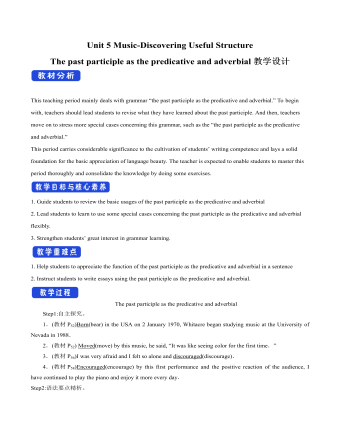
新人教版高中英语必修2Unit 5 Music-Discovering Useful Structures教案一
Step1:自主探究。1.(教材P52)Born(bear) in the USA on 2 January 1970, Whitacre began studying music at the University of Nevada in 1988.2.(教材P52) Moved(move) by this music, he said, “It was like seeing color for the first time.”3.(教材P56)I was very afraid and I felt so alone and discouraged(discourage).4.(教材P58)Encouraged(encourage) by this first performance and the positive reaction of the audience, I have continued to play the piano and enjoy it more every day.Step2:语法要点精析。用法1:过去分词作表语1).过去分词可放在连系动词be, get, feel, remain, seem, look, become等之后作表语,表示主语所处的状态Tom was astonished to see a snake moving across the floor.汤姆很惊讶地看到一条蛇正爬过地板。Finally the baby felt tired of playing with those toys.终于婴儿厌倦了玩那些玩具。注意:1).过去分词作表语时与被动语态的区别过去分词作表语时,强调主语所处的状态;而动词的被动语态表示主语是动作的承受者,强调动作。The library is now closed.(状态)图书馆现在关闭了。The cup was broken by my little sister yesterday.(动作)昨天我妹妹把杯子打碎了。2)感觉类及物动词的现在分词与过去分词作表语的区别过去分词作表语多表示人自身的感受或事物自身的状态,常译作“感到……的”;现在分词多表示事物具有的特性,常译作“令人……的”。
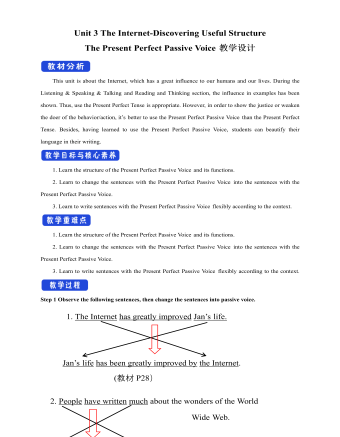
新人教版高中英语必修2Unit 3 The Internet-Discovering Useful Structure教案一
This unit is about the Internet, which has a great influence to our humans and our lives. During the Listening & Speaking & Talking and Reading and Thinking section, the influence in examples has been shown. Thus, use the Present Perfect Tense is appropriate. However, in order to show the justice or weaken the doer of the behavior/action, it’s better to use the Present Perfect Passive Voice than the Present Perfect Tense. Besides, having learned to use the Present Perfect Passive Voice, students can beautify their language in their writing. 1. Learn the structure of the Present Perfect Passive Voice and its functions. 2. Learn to change the sentences with the Present Perfect Passive Voice into the sentences with the Present Perfect Passive Voice. 3. Learn to write sentences with the Present Perfect Passive Voice flexibly according to the context. 1. Learn the structure of the Present Perfect Passive Voice and its functions. 2. Learn to change the sentences with the Present Perfect Passive Voice into the sentences with the Present Perfect Passive Voice. 3. Learn to write sentences with the Present Perfect Passive Voice flexibly according to the context. Step 1 Observe the following sentences, then change the sentences into passive voice.He has been selected to take part in the sports meeting.(肯定句)他已被挑选出来参加运动会。The ink has not been removed from his overcoat.(否定句)墨迹还没有从他外套上去掉。
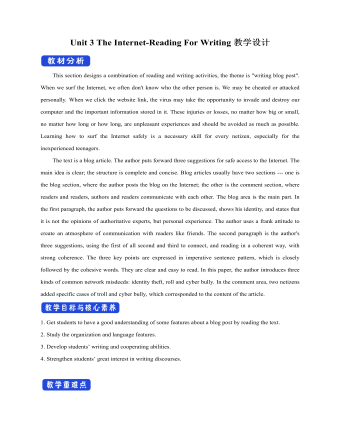
新人教版高中英语必修2Unit 3 The Internet-Reading For Writing教案一
⑦identity theft 身份盗窃⑧chat room 聊天室⑨draft your blog post 起草博客帖子⑩post embarrassing photos 张贴尴尬照片 【话题句式】 1. How do you stay safe online and avoid bad experiences on the Internet? 你如何在网上保持安全, 避免在网上的不良经历? 2. I’m not an expert, but many years as a blogger have taught me a thing or two. 我不是专家, 但作为一个博主, 我已经学了好几年了。 3. If you see or read something that makes you feel uncomfortable, leave the site immediately. 如果你看到或读到一些让你觉得不舒服的东西, 立即离开这个网站。4. Don’t give out your address or phone number. 别告诉别人你的地址或电话号码。 5. Identity theft is a common and serious problem. 身份盗窃是一个常见而严重的问题。6. Being online is no excuse for being rude, and you don’t want to become a target for a troll or cyberbully. 上网并不是无礼的借口, 你也不想成为发挑衅帖子的人或网络恶霸的目标。 7. Trolls often use several false names so that they can stay on a site. 发挑衅帖子的人经常使用几个假名, 这样他们就可以留在一个网站上。8. However, the more polite you are, the less likely it is you will be attacked. 然而, 你越有礼貌, 你被攻击的可能性就越小。
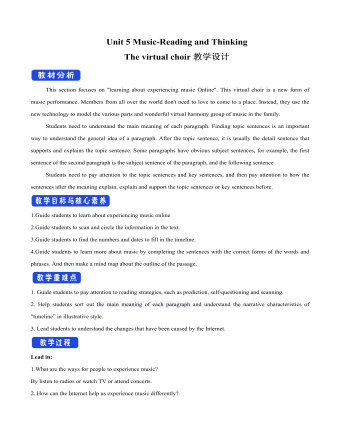
新人教版高中英语必修2Unit 5 Music-Reading and Thinking教案一
This section focuses on "learning about experiencing music Online". This virtual choir is a new form of music performance. Members from all over the world don't need to love to come to a place. Instead, they use the new technology to model the various parts and wonderful virtual harmony group of music in the family. Students need to understand the main meaning of each paragraph. Finding topic sentences is an important way to understand the general idea of a paragraph. After the topic sentence, it is usually the detail sentence that supports and explains the topic sentence. Some paragraphs have obvious subject sentences, for example, the first sentence of the second paragraph is the subject sentence of the paragraph, and the following sentenceStudents need to pay attention to the topic sentences and key sentences, and then pay attention to how the sentences after the meaning explain, explain and support the topic sentences or key sentences before.1.Guide students to learn about experiencing music online2.Guide students to scan and circle the information in the text.3.Guide students to find the numbers and dates to fill in the timeline.4.Guide students to learn more about music by completing the sentences with the correct forms of the words and phrases. And then make a mind map about the outline of the passage.1. Guide students to pay attention to reading strategies, such as prediction, self-questioning and scanning.2. Help students sort out the main meaning of each paragraph and understand the narrative characteristics of "timeline” in illustrative style.3. Lead students to understand the changes that have been caused by the Internet.
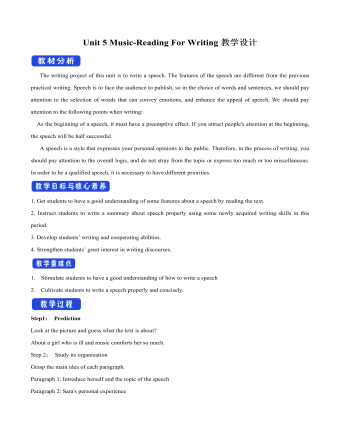
新人教版高中英语必修2Unit 5 Music-Reading For Writing教案一
(4)Now we have heard a number of outstanding speeches ... 我们已经聆听了许多精彩的发言……(5)Because we wanted the nations of the world, working together, to deal with ... 因为我们希望全世界各国团结起来去应对……(6)And if we do not act ... 如果我们不采取行动……(7)Now, I share the concerns that have been expressed ... 我也同意对于……表达的担心(8)Let us show the world that by working together we can ... 让我们告诉全世界,通过一起努力我们可以……(9)It is now time for us to ... 是时候我们……(10)And I have always wished that ... 我一直希望……(11)Thank you for letting me share this day with me.感谢你们和我共度这一天。实践演练:假如你是高中生李华,你校将举办一次以“音乐”为主题的演讲比赛,请你按照主题,写下你的演讲稿。注意:词数100左右。First of all, thank you for listening to my speech. My topic is: love music like love yourself.Music is like the air we need to maintain our normal lives around us. You can't imagine how terrible a world without music would be. Movies and TV shows have no music, only dry conversations and scenes; mobile phones only vibrations; streets only noisy crowds; cafes, western restaurants only depressed meals. What a terrible world it is!As a student, I hope we all can enjoy the fun brought by music in our spare time. Instead of just listening to music, we can even make our own music. Let's enjoy the fun of music!Thanks again for your attention!
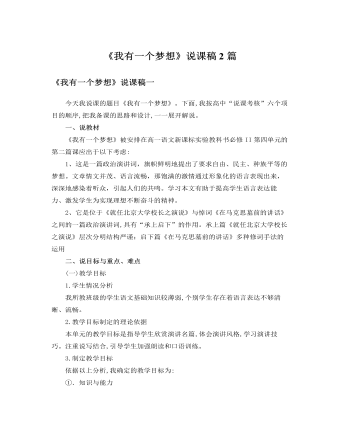
人教版高中语文必修2《我有一个梦想》说课稿2篇
(2).教学手段为了使我根据教材而设计的三个教学目标以及重点难点得以的突出和突破,达到最大化的展示境界,同时也为了配合以上我选择的四种教法得以完满实现,我决定采用“多媒体”教学手段进行全程教学。利用电脑的信息容量大,操作简便等优点,形象生动的直观展示教学内容,不但提高学习效率和质量,而且容易激发学生的学习兴趣和调动学习的积极性。四、说学法我为学生设计了三个学习方法:1.让学生学会在探究中学。通过“对黑人严酷处境的探究”和对文中重点语句的探究,培养学生在探究中学习的能力。2.让学生学会在读中学。通过“诵读法”指导学生在诵读过程中感受演讲词内在的魅力,学会在读中学。3.让学生学会在练习中学。通过“课外延伸练习法”,对所学的知识进行运用,培养学生的创新和自学能力。
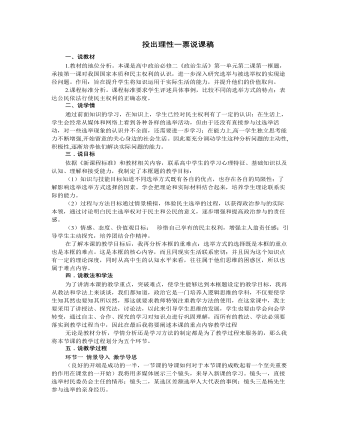
人教版高中政治必修2投出理性一票说课稿
环节三情景模拟 情感升华首先:1、本课开始观看的视频中:选出村长体现了村民参加选举的什么态度?生活中一些人“多我一票不多,少我一票不少,选举与我无关"的想法2、你如何看待上述两种不同态度?为什么?发表你的看法【教师这个过程中点拨、引导】如果我们都不珍惜自己的选举权,那么我们的国家将会出现什么后果?3、那么作为将来选民和被选举人,你们认为应具有那些政治素养才能适应?学生结合教材思考(1)(提示)不行使或不认真行使自己的选举权,意味着我们将不能选举出能为人民谋福利的当家人,意味着我们的国家将由重蹈旧中国的覆辙。(2)从态度上讲:公民应积极参加选举,认真行使这一权利,不断增强公民意识和主人翁意识,增强公民的参与感和责任感。(3)从能力上讲:要不断提高公民的政治参与能力(政治素质、文化素质、议政能力),在周全考虑、理性判断的基础上,郑重地投出自己的一票。
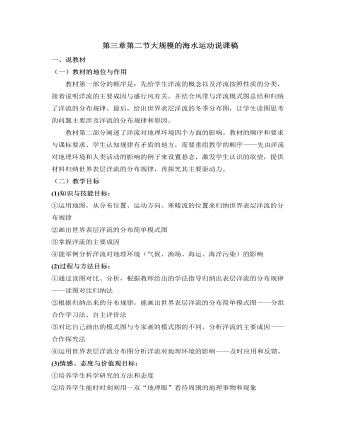
人教版高中地理必修1第三章第二节大规模的海水运动说课稿
(一)教材的地位与作用教材第一部分的顺序是:先给学生洋流的概念以及洋流按照性质的分类,接着说明洋流的主要成因与盛行风有关。并结合风带与洋流模式图总结和归纳了洋流的分布规律。最后,给出世界表层洋流的冬季分布图,让学生读图思考的问题主要涉及洋流的分布规律和原因。教材第二部分阐述了洋流对地理环境四个方面的影响。教材的顺序和要求与课标要求、学生认知规律有矛盾的地方,需要重组教学的顺序——先由洋流对地理环境和人类活动的影响的例子来设置悬念,激发学生认识的欲望,提供材料归纳世界表层洋流的分布规律,再探究其主要驱动力。(二)教学目标(1)知识与技能目标:①运用地图,从分布位置、运动方向、寒暖流的位置来归纳世界表层洋流的分布规律②画出世界表层洋流的分布简单模式图③掌握洋流的主要成因
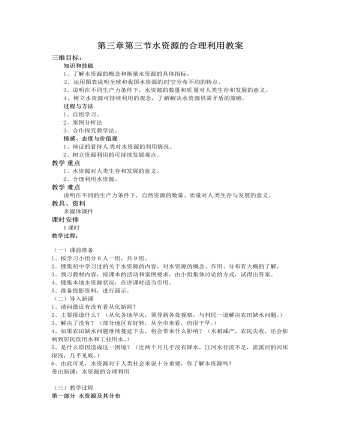
人教版高中地理必修1第三章第三节水资源的合理利用教案
5、请列举开源的措施。(包括合理开发和提取地下水;修筑水库;开渠引水实行跨流域调水;海水淡化;人工增雨等。6、开源“五水”歌:开发地下水、蓄积洪水,跨流域调水,淡水海水,人增雨水。能马上背出来吗?7、请列举节流的措施。(包括加强宣传教育,提高公民节水意识;重视改进农业灌溉技术,提高工业用水的重复利用率等。)8、水资源时刻影响着我们的生存和发展,尽管我们已经学习了关于如何合理利用水资源的知识,但关键还是要研究问题和解决问题,面对复杂的生活环境,具体问题要具体分析,看课本70页“活动”,请小组派代表回答问题。提示:(1)西北地区的水资源供给,从可持续发展的角度,解决水资源的供求矛盾应体现在:控制人口数量,减少用水规模;发展节水农业;保护生态环境,退耕还林还草。(2)我国缺水问题,谈谈看法:通过电视、报纸杂志、互联网收集有关水资源的资料;确定综合思维、立体思维的方法,全面多角度地寻找解决缺水的对策。
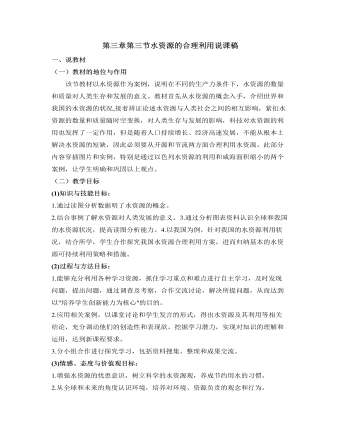
人教版高中地理必修1第三章第三节水资源的合理利用说课稿
(一)教材的地位与作用该节教材以水资源作为案例,说明在不同的生产力条件下,水资源的数量和质量对人类生存和发展的意义。教材首先从水资源的概念入手,介绍世界和我国的水资源的状况,接着辨证论述水资源与人类社会之间的相互影响,紧扣水资源的数量和质量随时空变换,对人类生存与发展的影响,科技对水资源的利用也发挥了一定作用,但是随着人口持续增长、经济高速发展,不能从根本上解决水资源的短缺,因此必须要从开源和节流两方面合理利用水资源。此部分内容穿插图片和实例,特别是通过以色列水资源的利用和咸海面积缩小的两个案例,让学生明确和巩固以上观点。(二)教学目标(1)知识与技能目标:1.通过读图分析数据明了水资源的概念。2.结合事例了解水资源对人类发展的意义。3.通过分析图表资料认识全球和我国的水资源状况,提高读图分析能力。4.以我国为例,针对我国的水资源利用状况,结合所学,学生合作探究我国水资源合理利用方案,进而归纳基本的水资源可持续利用策略和措施。
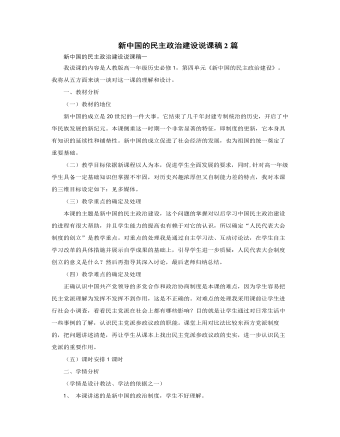
人教版高中历史必修1新中国的民主政治建设说课稿2篇
(一)教材的地位新中国的成立是20世纪的一件大事。它结束了几千年封建专制统治的历史,开启了中华民族发展的新纪元。本课侧重这一时期一个非常显著的特征,即制度的更新,它本身具有知识的延续性和铺垫性。新中国的成立促进了社会经济的发展,也为祖国的统一奠定了重要基础。(二)教学目标依据新课程以人为本,促进学生全面发展的要求,同时,针对高一年级学生具备一定基础知识但掌握不牢固,对历史兴趣浓厚但又自制能力差的特点,我对本课的三维目标设定如下:见多媒体。(三)教学重点的确定及处理本课的主题是新中国的民主政治建设,这个问题的掌握对以后学习中国民主政治建设的进程有很大帮助,并且学生能力的提高也有赖于对它的认识,所以确定“人民代表大会制度的创立”是教学重点。
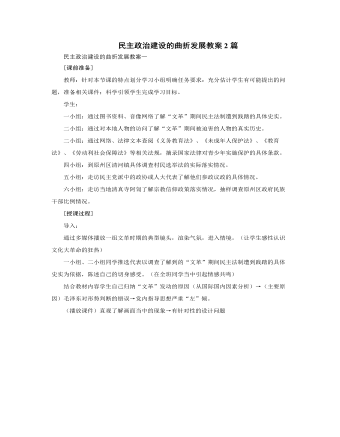
人教版高中历史必修1民主政治建设的曲折发展教案2篇
3.法律制度走向健全关于法律制度走向健全的历史条件,可指导学生阅读教材相关段落,教师适当补充说明,得出结论:提出法制建设方针并着手平反冤假错案,这是恢复和加强民主法制建设的重要举措。为全面开展法制建设准备了政治基础。关于法制建设方针的提出,可由教师补充材料,使学生理解加强法制建设的必要性,如:邓小平会见意大利记者奥琳埃娜?法拉奇(1980年8月)“奥:我看不出怎样才能避免或防止再发生诸如“文化大革命”这样可怕的事情。”“邓:这要从制度方面解决问题。我们过去的一些制度,实际上受了封建主义的影响,包括个人迷信、家长制或家长作风,甚至包括干部职务终身制。我们现在正在研究避免重复这种现象,准备从改革制度着手。我们这个国家有几千年封建社会的历史,缺乏社会主义的民主和社会主义的法制。现在我们要认真建立社会主义的民主制度和社会主义法制。只有这样,才能解决问题。”
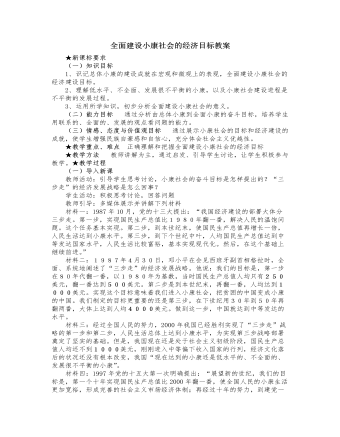
人教版高中政治必修1全面建设小康社会的经济目标教案
3、城镇人口的比重大幅度提高,工农差别、城乡差别、地区差别扩大的趋势逐步扭转请同学们阅读下面材料,结合刚才列举的实例,思考它说明什么问题?2000年我国农村小康总体实现程度在93%左右,城乡收入差距在3:1以上。1999年西部地区小康实现程度为84.18%,中部和东部地区为93.18%、97.86%,人均GDP最高的上海市突破4000美元,最低的贵州省只有300多美元。4、社会保障体系比较健全,社会就业比较充分,家庭财产普遍提高,人民过上更加富足的生活教师活动:请同学们阅读教材102页虚框内材料,思考所提问题学生活动:积极思考,讨论发言。教师总结:说明我国的社会保障体系逐步完善,但是城镇居民保障水平较高,农村社会保障水平还比较低。这与我国的国情是不相适应的,因此,本世纪初20年,要不断健全、完善社会保障体系,集中力量发展经济,降低失业率,提高城乡居民文化教育娱乐等消费比例,让人民的吃穿住行达到更高水平的小康。三、小康社会的建设特点和要求





















